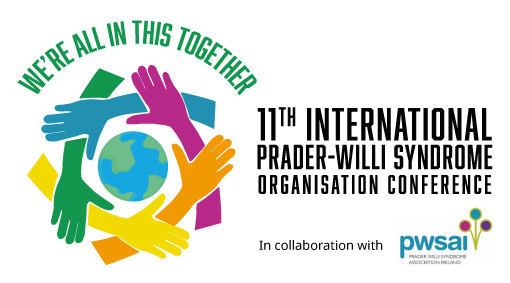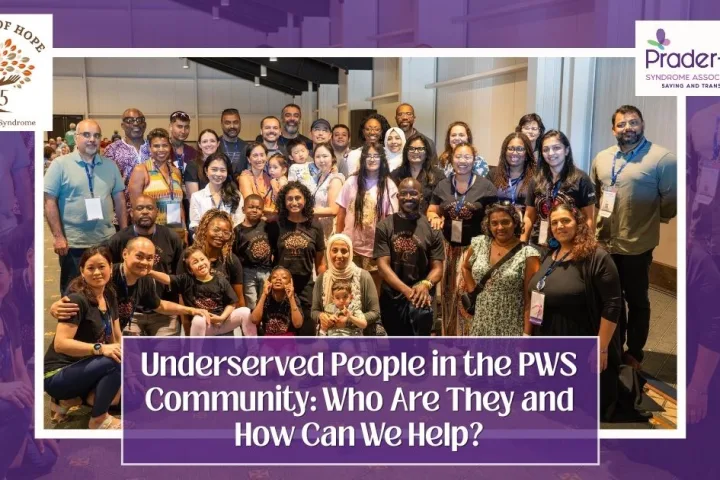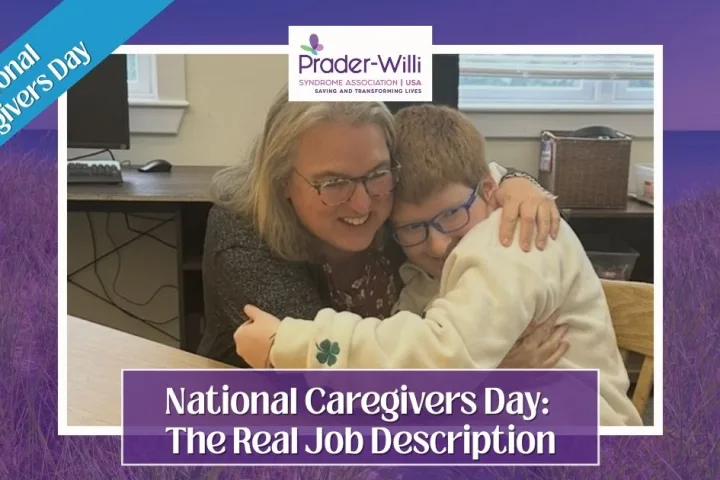IPWSO 2022 - Call for Abstracts: Professional Providers and Caregivers - 7 & 8 July 2022, University of Limerick, Ireland.
Please spread the word! The IPWSO 2022 Professional Providers and Caregivers Conference is now calling for abstracts for presentations to be submitted for the Conference on 7 and 8 July 2022 at the University of Limerick, Limerick City, Ireland.
If you are involved in the professional work of caring for children, young people, adults, and aging adults with Prader-Willi syndrome, please share your vision, successes, challenges, and experiences at this Conference. Guidelines and details about submitting your abstract can be found here. The closing date is 5 February 2022. Desired topics include, but are not limited to:
Behavior:
Behavior plays a central role in the social context. In people with Prader-Willi syndrome, unexpected behaviors are often a major challenge for parents and professional caregivers. How can we respond to these unexpected and challenging behaviors so that people with Prader-Willi syndrome can learn to control their behavior, so they are best equipped to participate in their social environment?
For this, it is necessary to identify the motivation underlying the individual behavior and which models and methods are suitable and have been proven to support this goal. One key to success lies in the intensive collaboration among the various disciplines such as pedagogues, social workers, educators, psychologists, psychiatrists, doctors, endocrinologists, geneticists and researchers on Prader-Willi syndrome, other therapists and last but not least, the parents.
Suggested topics include what approaches and procedures have proven themselves in practice, the contributions of the various disciplines and what should be the focus for further work.
Restrictive Practices: the ways in which restrictive practices relate to the professional care of people with PWS.
Suggested topics include case studies, proposed models of restrictive practice for people with PWS, or academic research into restrictive practices used to manage PWS.
Social Media
Social media has become an important part of daily life. Through social media individuals can stay connected to their community, friends, and family. There is also an increased risk for abuse and exploitation. Education for those with PWS and their caregivers can help to minimize the risk and allow for safe and enjoyable participation in social media.
Wellbeing
What we think of as wellbeing in the general population can look very different for people with PWS. The environment might include accepted restrictions for the individual’s health and safety which will help them to flourish. Allowing for individual choice, providing social opportunities, and recognizing the particular strengths of people with PWS and the positive nature of what they contribute, can help to ensure personal wellbeing.
--------------------------------------------------------------------------------------------------------------------
IPWSO 2022 – Call for Abstracts: Clinical and Scientific Conference 7 & 8 July 2022, University of Limerick, Ireland.
The IPWSO 2022 Clinical and Scientific Conference is calling for abstracts for presentations to be submitted for the Conference on July 7 and 8, 2022 at the University of Limerick, Limerick City, Ireland.
The Clinical and Scientific Conference aims to include reports of advances in clinical research in the basic and behavioral sciences and in neurosciences with the aim of advancing our knowledge of Prader-Willi syndrome (PWS) and thereby improving our understanding and developing new treatments for people with PWS. The Conference includes invited speakers from relevant fields of science outside of PWS and is truly interdisciplinary in nature. Guidelines and details about submitting your abstract can be found here. The closing date is February 5, 2022.
Desired topics include, but are not limited to:
- Genetics and Epigenetics
Examples include:
- Advances in Genetics in PWS
- Epigenetics: influences on brain development and behavior
- Endocrinology (Growth Hormone, Oxytocin, Ghrelin, etc.)
Examples include:
- Hormonal studies
- Hypogonadism
- Recent advances in Endocrinology in Adults with PWS
- Gastrointestinal Issues and Nutrition
- Examples include:
- Comprehensive Overview of Digestive Issues in PWS
- Chewing, swallowing, reflux, and aspiration
- Neuroscience, Mental Health and Behavior
Examples include:
- Brain structure and function in people with PWS
- Approaches to understanding mental health and behavior (the IPWSO Mental Health Initiative)
- New findings and treatment approaches to hyperphagia and behavior
- Recent Advances and New Knowledge in Medical Issues (including Orthopedics, Urinary Tract etc.)
Examples include:
- Overview and Evaluation: Infants, Children, Adolescents and Adults with PWS
- The Orthopedics of PWS
- Animal Models & Use of Induced Pluripotent Stem Cells in PWS
Examples include:
- Insights into mood and psychosis in PWS
- The hypothalamus and its connections
- Clinical Trials for Hyperphagia and Behavior
- The early PWS phenotype
Examples include:
- Fetal and placenta development
- Infancy
- Transition to Adulthood
Examples include:
- Hormone replacement therapy
Visit the IPWSO 2022 website for further information about the full Conference Program, Keynote Speakers, Online Registration, Accommodation and booking your travel.
Share this!





 Perry A. Zirkel has written more than 1,500 publications on various aspects of school law, with an emphasis on legal issues in special education. He writes a regular column for NAESP’s Principal magazine and NASP’s Communiqué newsletter, and he did so previously for Phi Delta Kappan and Teaching Exceptional Children.
Perry A. Zirkel has written more than 1,500 publications on various aspects of school law, with an emphasis on legal issues in special education. He writes a regular column for NAESP’s Principal magazine and NASP’s Communiqué newsletter, and he did so previously for Phi Delta Kappan and Teaching Exceptional Children. Jennifer Bolander has been serving as a Special Education Specialist for PWSA (USA) since October of 2015. She is a graduate of John Carroll University and lives in Ohio with her husband Brad and daughters Kate (17), and Sophia (13) who was born with PWS.
Jennifer Bolander has been serving as a Special Education Specialist for PWSA (USA) since October of 2015. She is a graduate of John Carroll University and lives in Ohio with her husband Brad and daughters Kate (17), and Sophia (13) who was born with PWS. Dr. Amy McTighe is the PWS Program Manager and Inpatient Teacher at the Center for Prader-Willi Syndrome at the Children’s Institute of Pittsburgh. She graduated from Duquesne University receiving her Bachelor’s and Master’s degree in Education with a focus on elementary education, special education, and language arts.
Dr. Amy McTighe is the PWS Program Manager and Inpatient Teacher at the Center for Prader-Willi Syndrome at the Children’s Institute of Pittsburgh. She graduated from Duquesne University receiving her Bachelor’s and Master’s degree in Education with a focus on elementary education, special education, and language arts. Evan has worked with the Prader-Willi Syndrome Association (USA) since 2007 primarily as a Crisis Intervention and Family Support Counselor. Evans works with parents and schools to foster strong collaborative relationships and appropriate educational environments for students with PWS.
Evan has worked with the Prader-Willi Syndrome Association (USA) since 2007 primarily as a Crisis Intervention and Family Support Counselor. Evans works with parents and schools to foster strong collaborative relationships and appropriate educational environments for students with PWS. Staci Zimmerman works for Prader-Willi Syndrome Association of Colorado as an Individualized Education Program (IEP) consultant. Staci collaborates with the PWS multi-disciplinary clinic at the Children’s Hospital in Denver supporting families and school districts around the United States with their child’s Individual Educational Plan.
Staci Zimmerman works for Prader-Willi Syndrome Association of Colorado as an Individualized Education Program (IEP) consultant. Staci collaborates with the PWS multi-disciplinary clinic at the Children’s Hospital in Denver supporting families and school districts around the United States with their child’s Individual Educational Plan. Founded in 2001, SDLC is a non-profit legal services organization dedicated to protecting and advancing the legal rights of people with disabilities throughout the South. It partners with the Southern Poverty Law Center, Protection and Advocacy (P&A) programs, Legal Services Corporations (LSC) and disability organizations on major, systemic disability rights issues involving the Individuals with Disabilities Education Act (IDEA), Americans with Disabilities Act (ADA), and the federal Medicaid Act. Recently in November 2014, Jim retired.
Founded in 2001, SDLC is a non-profit legal services organization dedicated to protecting and advancing the legal rights of people with disabilities throughout the South. It partners with the Southern Poverty Law Center, Protection and Advocacy (P&A) programs, Legal Services Corporations (LSC) and disability organizations on major, systemic disability rights issues involving the Individuals with Disabilities Education Act (IDEA), Americans with Disabilities Act (ADA), and the federal Medicaid Act. Recently in November 2014, Jim retired.